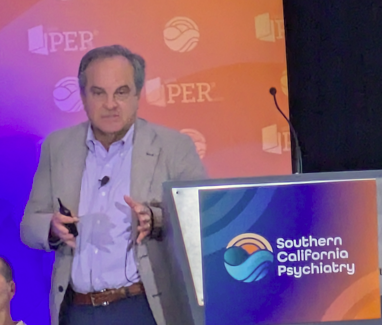CONFERENCE REPORTER
Psychiatric clinicians supporting patients with dementia-related agitation have faced significant challenges, without US Food and Drug Administration-approved options and restrictive warnings on commonly used treatments, explained Gerald Maguire, MD, at the 2025 Southern California Psychiatry Conference. Yet aggression occurs in 50% of all patients with Alzheimer disease and is associated with greater cognitive and functional dysfunction, he added.
“For years… we had nothing FDA approved to treat them,” said Maguire, director of residency training in psychiatry at College Medical Center in Long Beach, California. “In fact, if anything, agents we were using were given a box warning… about the risk potentially of increased mortality, cerebrovascular adverse events with antipsychotic agents in patients with agitation associated with dementia.”
For example, SSRIs are primarily ineffective and benzodiazepines are ineffective, he told attendees.
That landscape is beginning to shift, he shared in an exclusive interview with Psychiatric Times. “Fortunately, we have one agent that is on label now… for the treatment of patients with agitation associated with dementia due to Alzheimer’s,” Maguire explained.
Brexpiprazole (Rexulti; 2mg to 3mg per day) was approved in 2023 for this indication, he told attendees.2 In describing the mechanism of action, he said activity is across 3 monoamine systems: noradrenergic, serotonin, and dopamine. Maguire also noted that additional options may become available in the near future. He spoke about AXS-05 (bupropion/dextromethorphan) that showed 3 of 4 positive trials, including the ADVANCE and ACCORD trials.
Despite new pharmacologic avenues, Maguire emphasized the importance of evaluating nonpharmacologic and medical causes before initiating treatment. “Could there be something that’s leading to the agitation? Has a patient… had a change in environment?” he asked. Environmental disruptions, untreated pain, or comorbid medical conditions such as infections or metabolic disturbances must be ruled out. “Before we go adding on another medicine, make sure that we know medically what’s also going on for that patient.”
Timely intervention remains critical. “We do know that agitation in and of itself leads to a poor prognostic outcome for patients with dementia,” he said. Managing agitation effectively can improve quality of life and delay transitions to more restrictive care settings. “The longer we can keep patients at home, surrounded with their family members, the better.”
References
1. Maguire G. Managing Agitation in Dementia. Presented at: The Southern Psychiatry Conference; July 11-12, 2025; Huntington Beach, California.
2. FDA Approves First Drug to Treat Agitation Symptoms Associated with Dementia due to Alzheimer’s Disease. Press release. May 11 , 2023. Accessed July 12, 2025. https://www.fda.gov/news-events/press-announcements/fda-approves-first-drug-treat-agitation-symptoms-associated-dementia-due-alzheimers-disease
